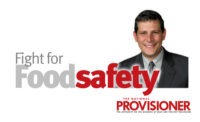Cordray's Corner
Allergens - A major cause of food recalls

Allergens are a major cause of food recalls in the United States and can be devastating to a company. However, there are several things you can do to minimize the chance of your products being involved in an allergen recall.
Employee Knowledge and Training
Your employees should know what allergens are and why it is critical to properly control them. Food allergens are naturally occurring proteins in food that cause an abnormal immune response. An adverse reaction to an allergen is referred to as a food allergy. For some people the allergic reaction can be very severe and very serious. The eight most common food allergens are; milk, eggs, tree nuts, peanuts, shellfish, wheat, soy and fish. An allergenic reaction to an allergen can cause; swelling of the tongue, mouth or face, difficulty breathing, low blood pressure, vomiting, diarrhea, hives or an itchy rash. In extreme cases the reaction can be fatal.
All of your employees should be trained in how to minimize the potential of undeclared allergens being in your products.
Seasoning Blends
Check the seasoning blends you use in manufacturing your products and make sure they do not contain any allergens that are listed on your label. If you use standard seasoning blends check each shipment to make sure the ingredient statement has not changed. If you change seasoning suppliers make sure the new blends do not contain allergens you do not have on your label. If you use a custom blended seasoning make sure your supplier knows not to modify your seasoning blend without first checking with you.
Make sure you use the correct seasoning blend in each product. For example, you may have two different smoked sausage seasonings; one with and one without soy protein. Document the use of the correct seasoning at the time of product manufacture.
Allergen Cross-Contact
Employees must understand allergen cross contact and be trained on how to prevent it. Cross-contact is when an allergen is accidentally transferred from a food that contains an allergen to a food that does not contain it. This can be a result of poor cleaning practices or inadequate handling and storage procedures.
To minimize the potential of cross-contact, processors frequently will produce allergen product at the end of the day, or sometimes allergen products are produced on a separate day. There are allergen swab tests you can use on equipment surfaces after it has been cleaned to verify it is allergen free.
Packaging
When product is placed in the wrong package or the wrong label is applied, that is human error. Employees must be trained to verify and document that the correct packaging and label are used each time a product is manufactured and packaged.
Allergen Recall Plan
Just in case something does go wrong and a recall is required, every meat processing establishment should have a Recall Plan. The Recall Plan should contain a Recall Flow Chart and Recall Procedures. The Recall Procedures should address; assignment of roles and responsibility, evaluation of the complaint or condition, identification of the implicated products, notification of affected parties and removal of affected products.
It is very important that you have in place the procedures to minimize the chance of an allergen recall. An important part of that is training your employees on how to handle allergens.
Remember: “An ounce of prevention is worth a pound of cure”. IP
Looking for a reprint of this article?
From high-res PDFs to custom plaques, order your copy today!






